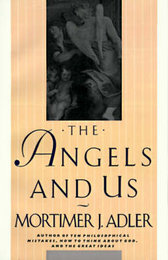
|
Angels and Us
Paperback
Main Details
| Title |
Angels and Us
|
| Authors and Contributors |
By (author) Mortimer J. Adler
|
| Physical Properties |
| Format:Paperback | | Pages:224 | | Dimensions(mm): Height 216,Width 140 |
|
| Category/Genre | History of Western philosophy
Christianity |
|---|
| ISBN/Barcode |
9780020300656
|
| Classifications | Dewey:191 |
|---|
| Audience | |
|---|
| Illustrations |
black & white illustrations
|
|
Publishing Details |
| Publisher |
Simon & Schuster
|
| Imprint |
Collier Paperbacks,U.S.
|
| Publication Date |
19 September 1993 |
| Publication Country |
United States
|
Description
Mortimer Adler has always been ahead of his time. In 1982, before the current revival of interest in angels, Dr. Adler published "The Angels and Us," an engaging look at the various images and hierarchies of angels (including guardian angels). Dr. Adler, the bestselling author of "Ten Philosophical Mistakes," "Aristotle for Everybody," and "The Great Ideas," speculates on the existence of angels; why Jews, Christians, and Muslims believe in angels, and the ways angels have been viewed as objects of religious belief and philosophical thought. This is a wonderfully enlightening work on the affinities between angels and human beings.
ReviewsKirkus Review US:A curious, mildly interesting survey of angelology. As a "modem pagan," Adler looks at angels not as objects of devotion but as intriguing philosophico-theological constructs. Regardless of whether they actually exist, angels allow us to toy with the possibility of disembodied minds and, says Adler, serve as a device for detecting spiritualistic fallacies in psychology, politics, linguistics, etc. Adler gives a clear enough precis of the vast tradition on angels (sensibly choosing Thomas Aquinas as its classic expositor), but many readers will no doubt balk at taking the imaginative leap of admitting even the potential reality of pure spirits. Hobbes argued that the very idea of incorporeal substance is as much a contradiction in terms as a round square, and Adler never really refutes him. (Adler characteristically neglects the mythological - and highly unspiritual - origins of biblical angels; knowing, for example, that cherubs were once tutelary gods of Baby-Ion, winged beasts with human faces, makes one wonder about their subsequent etherealization.) Still, there's merit in Adler's comparison of angelology with mathematics: both are self-consistent systems based on certain unprovable assumptions. And there's some speculative fun to be had thinking about angels, as when Adler suggests that an angel can occupy a body in physical space without leaving heaven, "just as a corporation that has its legal residence in Delaware can act in Honolulu without leaving the state in which it is incorporated." Adler's concluding thrusts at angelism in the work of various thinkers (Plato, Descartes, et al.) score direct hits, at rather close range. All in all, a dry but informative little study. (Kirkus Reviews)
|